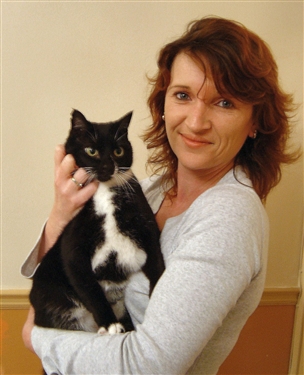Purr those blues away!
16 January 2012

According to Cats Protection, purr therapy is the answer to
ease the stress of Blue Monday (16 January) – dubbed the most depressing
day of the year.
A cat’s purr is widely recognised as having therapeutic benefits for
humans and therefore could help combat the inevitable January gloom,
brought on by cold weather, unpaid Christmas bills and failed New Year
resolutions.
Furthermore, the charity says that curling up with a feline friend is
even known to lower blood pressure so cats really could be the purr-fect
remedy for New Year blues.
“Sitting with a relaxed purring cat at the end of a hectic day is a
soothing massage for the soul,” said Rob Hall, Volunteer Branch Co-ordinator with the Stourbridge and District Branch. “Perhaps this is because the
reassuring hum is generally associated with calmness and gentle
communication, or perhaps it is because the frequency of the vibration
is in the range that can stimulate healing.”
Cats Protection’s recommendation is backed up by research carried out
last summer, in conjunction with the Mental Health Foundation, which
showed that owning a cat can help lift the spirits.
The survey found that 87% of people who owned a cat felt it had a
positive impact on their wellbeing, while 76% said they could cope with
everyday life much better thanks to the company of their feline friends.
Half of the cat owners felt that their cat’s presence and companionship
was most helpful, followed by a third of respondents describing
stroking a cat as a calming and helpful activity.
“These findings tell us what cat lovers have known for years – cats are
not just great company but they can also be very good for you,” said Rob. “There are many cats and kittens in our care that
desperately need new homes and could help chase away the Monday blues.”
Cats purr in a range of situations - though how and why is not fully
understood. It’s commonly believed that purring is a sign of contentment
but this is not always the case as they have also been known to purr
when they are in pain. Other lesser known facts include:
- Cats purr by themselves as well as when around people
- Female cats are known to sometimes purr while giving birth
- Kittens are able to purr almost from birth and primarily purr when they are suckling
- The mechanism by which cats purr is elusive because there isn't a
specific part of their body that produces the sound. It has been
suggested that twitching the muscles in their voicebox, the larynx,
rapidly dilates and constricts the glottis, causing air vibrations as
they breathe in and out
- The loudest purring domestic cat is Smokey from Northampton who
has received a Guinness World Record Certificate after her purr was
found to be 14 times louder than average.
Why not purr your blues way by adopting a cat?